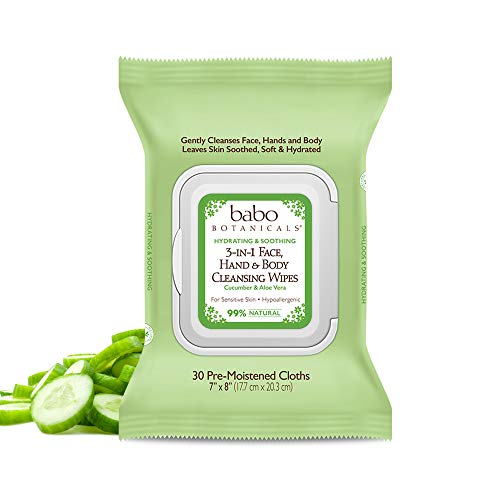
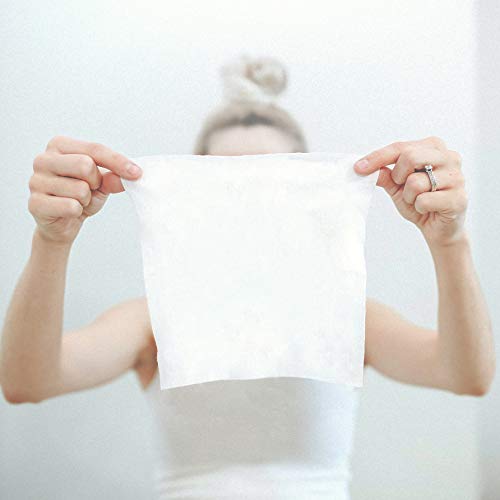
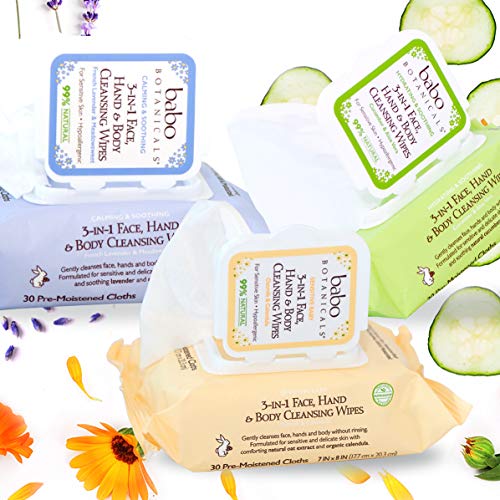

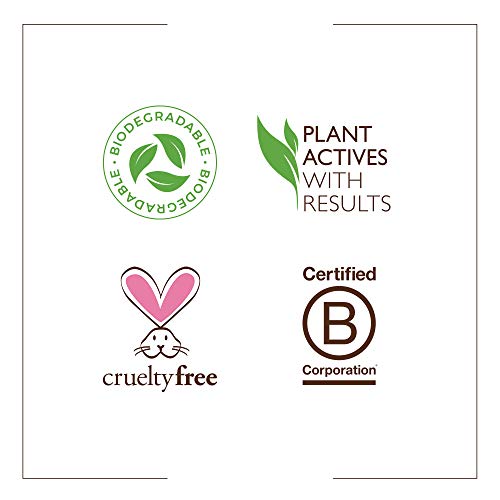
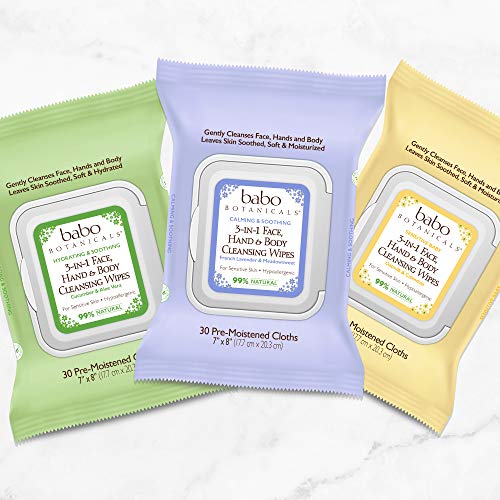
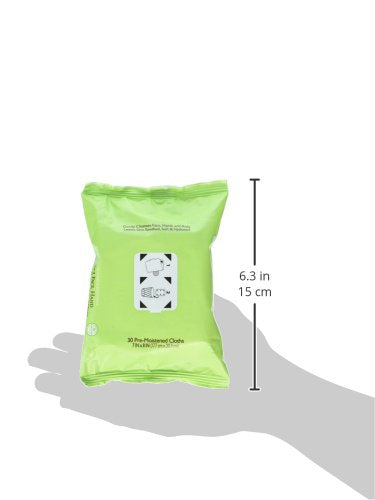
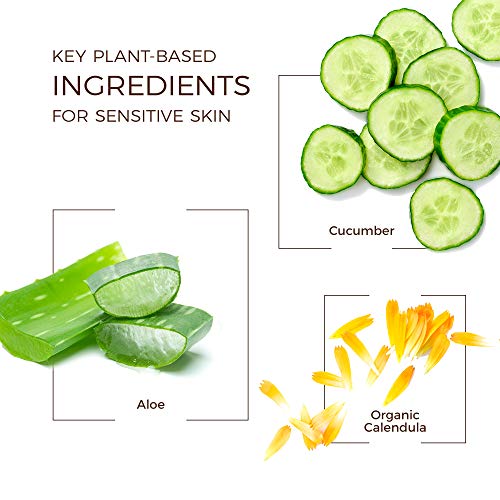
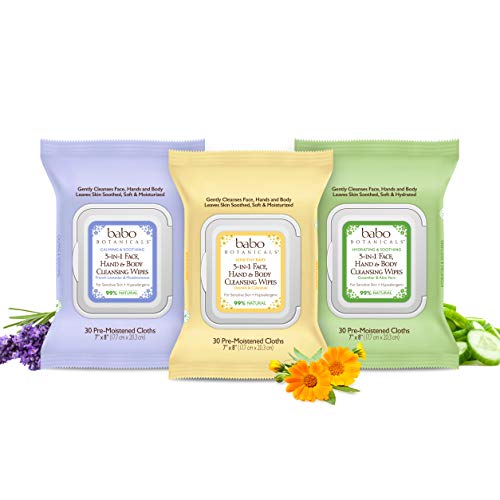
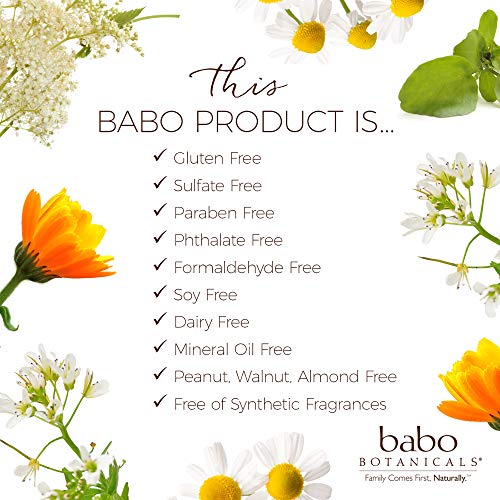
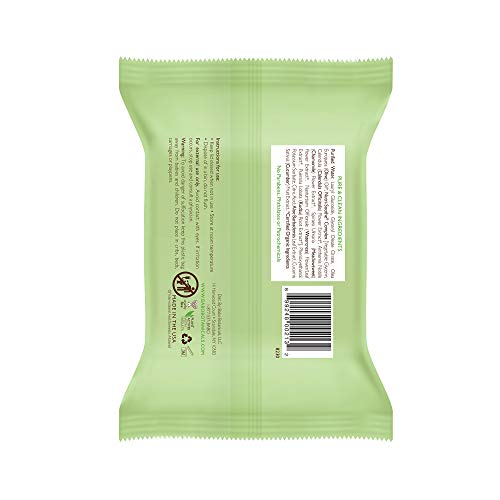
Babo Botanicals 3-in-1 Cleansing Wipes - Gentle for Sensitive Skin with Cucumber & Aloe - 30 ct


Phenoxyethanol
Medium RiskPhenoxyethanol is a preservative used in cosmetics and personal care products to prevent microbial growth and extend shelf life. It is commonly found in formulations such as lotions, creams, and serums.
Sustai Insights
Phenoxyethanol serves effectively as a preservative, ensuring product stability and safety by inhibiting microbial growth. It is considered to have low health risks regarding carcinogenicity, allergies, and reproductive toxicity. However, moderate use restrictions exist, and regulatory bodies have advised caution in specific applications. Environmental concerns include its potential as a pollutant, although it is not highly bioaccumulative. Overall, the ingredient presents a medium risk level, with safe usage practices recommended and alternative preservatives available for those seeking greener options.
Potassium Sorbate
Medium RiskPotassium sorbate is a potassium salt of sorbic acid, primarily used as a preservative in food and cosmetic products. It inhibits the growth of molds, yeast, and some bacteria, extending the shelf life of products. It is commonly found in various formulations due to its effectiveness and low toxicity.
Sustai Insights
Potassium sorbate serves as an effective preservative, preventing microbial growth in food and cosmetic products, which is vital for safety and longevity. Although it has a low risk of carcinogenicity and developmental toxicity, there is a moderate concern regarding allergies and immunotoxicity. Environmentally, it poses minimal risks as it is not significantly bioaccumulative. Regulatory agencies have verified its use, although some products may face restrictions. Overall, it is assessed as a medium risk ingredient, with safe usage practices recommended, and alternatives such as natural preservatives could be considered.
Citric Acid
Medium RiskCitric acid is an alpha hydroxy acid used in personal care products primarily for its role as a pH adjuster and natural preservative. It occurs naturally in citrus fruits and is commonly utilized in various formulations for its chelating properties and mild exfoliation benefits.
Sustai Insights
Citric acid offers functional benefits as an effective preservative and pH stabilizer, contributing to product longevity and stability. It is biodegradable and derived from renewable sources. Health risks are low, with minimal concerns regarding carcinogenicity, allergies, and reproductive toxicity. However, moderate use restrictions exist due to potential irritation at high concentrations. Environmental risks are limited, as citric acid is not known to accumulate in ecosystems. Regulatory agencies have no significant advisories against its use. Overall, it is assessed as a medium-risk ingredient, with safe usage practices recommended and alternatives available.
Caprylyl/ Capryl Glycoside
Low RiskCaprylyl/Capryl Glycoside is a surfactant derived from natural sources, primarily used in personal care and cosmetic products for its emulsifying properties. It helps to stabilize formulations and enhance cleaning efficacy while being gentle on the skin.
Sustai Insights
Caprylyl/Capryl Glycoside offers functional benefits as a mild surfactant and emulsifier, contributing to product stability without significant irritation. It is biodegradable and considered sustainably sourced. Health risks are low, with minimal concerns regarding carcinogenicity and developmental toxicity. Environmental impact is also low, as it does not accumulate in ecosystems. Regulatory assessments indicate no current restrictions. Overall, it presents a low risk profile, making it a suitable choice in formulations.
Glyceryl Oleate Citrate
Low RiskGlyceryl oleate citrate is a reaction product formed from glycerol, oleic acid, and citric acid, primarily used as an emulsifier and skin-conditioning agent in cosmetic formulations. It helps stabilize oil and water mixtures, enhancing product texture and performance.
Sustai Insights
Glyceryl oleate citrate offers functional benefits as an effective emulsifier and skin-conditioning agent, contributing to product stability and user experience. It is considered low risk for health concerns, including carcinogenicity, allergies, and reproductive toxicity. Environmentally, it poses minimal risk as it is not a known pollutant or bioaccumulative. Regulatory bodies do not impose restrictions on its use, indicating safe application in cosmetic products. Safe usage practices should be followed, and alternatives such as vegetable glycerin or other natural emulsifiers could be considered for formulation. Overall, the ingredient is assessed as low risk.
Olea Europaea (Olive) Oil
Low RiskOlea europaea (olive) oil is derived from the ripe fruit of the olive tree. It is commonly used in cosmetic formulations primarily as a moisturizer and emollient due to its nourishing properties for the skin. It also serves as a carrier oil for other ingredients in formulations.
Sustai Insights
Olea europaea (olive) oil offers numerous functional benefits, including effective moisturization and enhanced skin absorption properties, making it suitable for various cosmetic applications. It is a biodegradable ingredient, contributing to sustainability when sourced responsibly. Health risks are low, with minimal concerns regarding carcinogenicity, allergenic potential, and developmental toxicity. Environmental risks are also low, with no significant bioaccumulation or pollution potential noted. Regulatory bodies do not impose restrictions on its use. Overall, olive oil presents a low risk profile, making it a favorable choice in cosmetic products.
Aloe Barbadensis (Aloe Vera) Leaf Extract
Low RiskAloe vera leaf extract is produced from the succulent leaves of the Aloe barbadensis plant. It is commonly used in cosmetic formulations for its moisturizing and soothing properties, making it a popular ingredient in skincare and personal care products.
Sustai Insights
Aloe vera leaf extract offers several functional benefits, including hydration and skin soothing effects, which are well-supported by scientific literature. It is considered to have a low risk for common health concerns such as carcinogenicity, allergies, or reproductive toxicity. Environmentally, it poses minimal risks, with no significant pollutant potential or bioaccumulation reported. Regulatory bodies have not imposed major restrictions, although verified products should not contain certain contaminants. Overall, this ingredient is assessed as low risk, with safe usage practices and the availability of alternative soothing agents if desired.
Spiraea Ulmaria (Meadowsweet) Flower Extract
Low RiskSpiraea ulmaria (meadowsweet) flower extract is derived from the flowers of the Spiraea ulmaria plant. It is commonly used in cosmetic formulations for its soothing properties and is known for its role in skin care as an anti-inflammatory and astringent agent.
Sustai Insights
Meadowsweet flower extract offers functional benefits such as anti-inflammatory and astringent properties, making it useful in soothing skin formulations. It is sustainably sourced and generally recognized as safe, with low concerns regarding carcinogenicity, allergies, and reproductive toxicity. Environmental risks are minimal, as it does not contribute significantly to pollution or bioaccumulation. Regulatory bodies do not impose restrictions on its use. Overall, the ingredient presents a low risk profile, making it a viable choice in cosmetic products.
Anthemis Nobilis (Chamomile) Flower Extract
Low RiskAnthemis nobilis (chamomile) flower extract is derived from the flowers of the chamomile plant. It is commonly used in cosmetic and personal care products for its soothing properties and potential anti-inflammatory effects. Its role primarily centers around skin calming and providing a pleasant fragrance.
Sustai Insights
Chamomile extract offers functional benefits, particularly in soothing irritated skin and reducing inflammation. It is considered sustainably sourced and biodegradable. Health risks are minimal, with low concerns for carcinogenicity, allergies, and neurotoxicity. Environmental risks are also low, with no significant pollutant or bioaccumulation potential. Regulatory status indicates no major restrictions, affirming its safe use in cosmetics. Overall, this ingredient presents a low risk, making it a favorable choice in personal care formulations.
Cucumis Sativus (Cucumber) Fruit Extract
Low RiskCucumis sativus (cucumber) fruit extract is derived from the fruit of the cucumber plant. It is commonly used in cosmetic formulations for its hydrating and soothing properties, often included in products aimed at providing moisture and calming effects to the skin.
Sustai Insights
Cucumis sativus fruit extract offers functional benefits such as hydration and soothing effects on the skin, contributing to the overall efficacy of cosmetic products. It is regarded as low risk with minimal health concerns, including low potential for carcinogenicity, irritation, or allergies. Environmental risks are also low, with no significant pollutant or bioaccumulation concerns. Regulatory bodies do not impose restrictions on its use, supporting its safety in cosmetics. Safe usage practices include ensuring proper formulation concentrations. Overall, this ingredient presents a low risk profile, making it a suitable choice for various cosmetic applications.
Caprylyl/ Capryl Glycoside
Low RiskCaprylyl/Capryl Glycoside is a surfactant derived from natural sources, primarily used in personal care and cosmetic products for its emulsifying properties. It helps to stabilize formulations and enhance cleaning efficacy while being gentle on the skin.
Sustai Insights
Caprylyl/Capryl Glycoside offers functional benefits as a mild surfactant and emulsifier, contributing to product stability without significant irritation. It is biodegradable and considered sustainably sourced. Health risks are low, with minimal concerns regarding carcinogenicity and developmental toxicity. Environmental impact is also low, as it does not accumulate in ecosystems. Regulatory assessments indicate no current restrictions. Overall, it presents a low risk profile, making it a suitable choice in formulations.
Glyceryl Oleate Citrate
Low RiskGlyceryl oleate citrate is a reaction product formed from glycerol, oleic acid, and citric acid, primarily used as an emulsifier and skin-conditioning agent in cosmetic formulations. It helps stabilize oil and water mixtures, enhancing product texture and performance.
Sustai Insights
Glyceryl oleate citrate offers functional benefits as an effective emulsifier and skin-conditioning agent, contributing to product stability and user experience. It is considered low risk for health concerns, including carcinogenicity, allergies, and reproductive toxicity. Environmentally, it poses minimal risk as it is not a known pollutant or bioaccumulative. Regulatory bodies do not impose restrictions on its use, indicating safe application in cosmetic products. Safe usage practices should be followed, and alternatives such as vegetable glycerin or other natural emulsifiers could be considered for formulation. Overall, the ingredient is assessed as low risk.
Olea Europaea (Olive) Oil
Low RiskOlea europaea (olive) oil is derived from the ripe fruit of the olive tree. It is commonly used in cosmetic formulations primarily as a moisturizer and emollient due to its nourishing properties for the skin. It also serves as a carrier oil for other ingredients in formulations.
Sustai Insights
Olea europaea (olive) oil offers numerous functional benefits, including effective moisturization and enhanced skin absorption properties, making it suitable for various cosmetic applications. It is a biodegradable ingredient, contributing to sustainability when sourced responsibly. Health risks are low, with minimal concerns regarding carcinogenicity, allergenic potential, and developmental toxicity. Environmental risks are also low, with no significant bioaccumulation or pollution potential noted. Regulatory bodies do not impose restrictions on its use. Overall, olive oil presents a low risk profile, making it a favorable choice in cosmetic products.
Phenoxyethanol
Medium RiskPhenoxyethanol is a preservative used in cosmetics and personal care products to prevent microbial growth and extend shelf life. It is commonly found in formulations such as lotions, creams, and serums.
Sustai Insights
Phenoxyethanol serves effectively as a preservative, ensuring product stability and safety by inhibiting microbial growth. It is considered to have low health risks regarding carcinogenicity, allergies, and reproductive toxicity. However, moderate use restrictions exist, and regulatory bodies have advised caution in specific applications. Environmental concerns include its potential as a pollutant, although it is not highly bioaccumulative. Overall, the ingredient presents a medium risk level, with safe usage practices recommended and alternative preservatives available for those seeking greener options.
Aloe Barbadensis (Aloe Vera) Leaf Extract
Low RiskAloe vera leaf extract is produced from the succulent leaves of the Aloe barbadensis plant. It is commonly used in cosmetic formulations for its moisturizing and soothing properties, making it a popular ingredient in skincare and personal care products.
Sustai Insights
Aloe vera leaf extract offers several functional benefits, including hydration and skin soothing effects, which are well-supported by scientific literature. It is considered to have a low risk for common health concerns such as carcinogenicity, allergies, or reproductive toxicity. Environmentally, it poses minimal risks, with no significant pollutant potential or bioaccumulation reported. Regulatory bodies have not imposed major restrictions, although verified products should not contain certain contaminants. Overall, this ingredient is assessed as low risk, with safe usage practices and the availability of alternative soothing agents if desired.
Potassium Sorbate
Medium RiskPotassium sorbate is a potassium salt of sorbic acid, primarily used as a preservative in food and cosmetic products. It inhibits the growth of molds, yeast, and some bacteria, extending the shelf life of products. It is commonly found in various formulations due to its effectiveness and low toxicity.
Sustai Insights
Potassium sorbate serves as an effective preservative, preventing microbial growth in food and cosmetic products, which is vital for safety and longevity. Although it has a low risk of carcinogenicity and developmental toxicity, there is a moderate concern regarding allergies and immunotoxicity. Environmentally, it poses minimal risks as it is not significantly bioaccumulative. Regulatory agencies have verified its use, although some products may face restrictions. Overall, it is assessed as a medium risk ingredient, with safe usage practices recommended, and alternatives such as natural preservatives could be considered.
Spiraea Ulmaria (Meadowsweet) Flower Extract
Low RiskSpiraea ulmaria (meadowsweet) flower extract is derived from the flowers of the Spiraea ulmaria plant. It is commonly used in cosmetic formulations for its soothing properties and is known for its role in skin care as an anti-inflammatory and astringent agent.
Sustai Insights
Meadowsweet flower extract offers functional benefits such as anti-inflammatory and astringent properties, making it useful in soothing skin formulations. It is sustainably sourced and generally recognized as safe, with low concerns regarding carcinogenicity, allergies, and reproductive toxicity. Environmental risks are minimal, as it does not contribute significantly to pollution or bioaccumulation. Regulatory bodies do not impose restrictions on its use. Overall, the ingredient presents a low risk profile, making it a viable choice in cosmetic products.
Anthemis Nobilis (Chamomile) Flower Extract
Low RiskAnthemis nobilis (chamomile) flower extract is derived from the flowers of the chamomile plant. It is commonly used in cosmetic and personal care products for its soothing properties and potential anti-inflammatory effects. Its role primarily centers around skin calming and providing a pleasant fragrance.
Sustai Insights
Chamomile extract offers functional benefits, particularly in soothing irritated skin and reducing inflammation. It is considered sustainably sourced and biodegradable. Health risks are minimal, with low concerns for carcinogenicity, allergies, and neurotoxicity. Environmental risks are also low, with no significant pollutant or bioaccumulation potential. Regulatory status indicates no major restrictions, affirming its safe use in cosmetics. Overall, this ingredient presents a low risk, making it a favorable choice in personal care formulations.
Citric Acid
Medium RiskCitric acid is an alpha hydroxy acid used in personal care products primarily for its role as a pH adjuster and natural preservative. It occurs naturally in citrus fruits and is commonly utilized in various formulations for its chelating properties and mild exfoliation benefits.
Sustai Insights
Citric acid offers functional benefits as an effective preservative and pH stabilizer, contributing to product longevity and stability. It is biodegradable and derived from renewable sources. Health risks are low, with minimal concerns regarding carcinogenicity, allergies, and reproductive toxicity. However, moderate use restrictions exist due to potential irritation at high concentrations. Environmental risks are limited, as citric acid is not known to accumulate in ecosystems. Regulatory agencies have no significant advisories against its use. Overall, it is assessed as a medium-risk ingredient, with safe usage practices recommended and alternatives available.
Cucumis Sativus (Cucumber) Fruit Extract
Low RiskCucumis sativus (cucumber) fruit extract is derived from the fruit of the cucumber plant. It is commonly used in cosmetic formulations for its hydrating and soothing properties, often included in products aimed at providing moisture and calming effects to the skin.
Sustai Insights
Cucumis sativus fruit extract offers functional benefits such as hydration and soothing effects on the skin, contributing to the overall efficacy of cosmetic products. It is regarded as low risk with minimal health concerns, including low potential for carcinogenicity, irritation, or allergies. Environmental risks are also low, with no significant pollutant or bioaccumulation concerns. Regulatory bodies do not impose restrictions on its use, supporting its safety in cosmetics. Safe usage practices include ensuring proper formulation concentrations. Overall, this ingredient presents a low risk profile, making it a suitable choice for various cosmetic applications.
Experience the gentle cleansing power of Babo Botanicals Swim & Sport 3-in-1 Face, Hand & Body Cleansing Wipes. Perfect for babies, kids, and those with extra sensitive skin, these wipes combine the soothing properties of natural cucumber and aloe vera to provide a refreshing clean without harsh chemicals.
- Gentle Cleansing: Soft wipes made from natural wood pulp clean and moisturize delicate skin, ensuring a soothing experience for all ages.
- Sensitive Skin Formula: Enriched with Babo's Organic Nutri-Soothe Complex, these wipes offer hydration and relief for very sensitive skin.
- Biodegradable & Natural: Crafted with 100% natural and biodegradable fibers, these eco-friendly wipes are safe for the planet and your family.
- Hypoallergenic & Safe: Clinically tested and free from gluten, soy, dairy, and common allergens, making them ideal for even the most sensitive users.
- Convenient On-the-Go Use: Perfect for quick clean-ups at home or while traveling, these wipes are a must-have for busy families looking for a sustainable option.
Subscribe & Save with Sustai
- Best Price Guarantee: Always enjoy the lowest prices on sustainable home essentials.
- No Surprises: We’ll notify you before shipping. No hidden fees, ever.
- You’re in Charge: Change, pause, or cancel your subscription anytime with ease.
- Eco-Friendly Deliveries: Our grouped shipments mean less packaging and lower emissions.
Join us on a sustainable journey. Special offers for a limited time! Prices and promotions may change.
Recommended Products
Experience the gentle cleansing power of Babo Botanicals Swim & Sport 3-in-1 Face, Hand & Body Cleansing Wipes. Perfect for babies, kids, and those with extra sensitive skin, these wipes combine the soothing properties of natural cucumber and aloe vera to provide a refreshing clean without harsh chemicals.
- Gentle Cleansing: Soft wipes made from natural wood pulp clean and moisturize delicate skin, ensuring a soothing experience for all ages.
- Sensitive Skin Formula: Enriched with Babo's Organic Nutri-Soothe Complex, these wipes offer hydration and relief for very sensitive skin.
- Biodegradable & Natural: Crafted with 100% natural and biodegradable fibers, these eco-friendly wipes are safe for the planet and your family.
- Hypoallergenic & Safe: Clinically tested and free from gluten, soy, dairy, and common allergens, making them ideal for even the most sensitive users.
- Convenient On-the-Go Use: Perfect for quick clean-ups at home or while traveling, these wipes are a must-have for busy families looking for a sustainable option.

You can have at most 2 Sustainable Steals products in your cart
Customer Reviews
Customers’ View
Customers generally appreciate the effectiveness and gentle nature of the Cleansing Wipes, particularly highlighting their suitability for sensitive skin. Many users note the pleasant natural scent, with comments such as, "They smell great and are very soft on the skin." The wipes are praised for their 3-in-1 functionality, providing cleansing, moisturizing, and refreshing benefits, making them ideal for on-the-go use. Additionally, the eco-friendly composition, featuring biodegradable cloth fibers and organic ingredients like cucumber and aloe vera, resonates well with environmentally conscious consumers. However, some feedback indicates concerns regarding skin irritation and varying opinions on the size of the wipes. Overall, the product is seen as a reliable option for families seeking gentle, effective, and sustainable cleansing solutions.
AI-generated from the text of customer reviewsThis product is rated 1.0 of 5.0 stars.
It has received 1 review.





